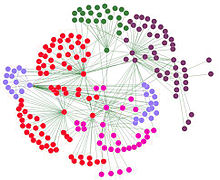Majority illusion
In mathematics,[1] the majority illusion[2] or majority paradox[3] is a math paradox that explain how bias are created. It applies to social media[4] and it has a connection with graph theory, data science and statistics.

History
changeIt was first proposed by Kristina Lerman, Principal Information Scientist and mathematician at the University of Southern California.[5]
Explanation
changeUsing graph theory we can imagine a network of 10 people, where 8 believe that God exists, and 2 that it does not exist. If a God believer is friend of those 2 who does not believe in God, that person will think that the majority are not believers, while the number of people of people believing that God exists quadruples the number of people who does not.
As Eduardo Saénz, Spanish mathematician said, "using complex data science and statistics, we can create algorithms which provide help for understanding complex networks, such as social media".[6][7][8]
On Twitter, this illusion is often displayed. [9] In 2020, a movement start growing in social media to pass from bots in order to do not give them support.[10]
References
change- ↑ Lerman, Kristina. "Why it seems like your friends have more to be thankful for". The Conversation. Retrieved 2022-05-04.
- ↑ "The Social-Network Illusion That Tricks Your Mind". MIT Technology Review. Retrieved 2022-05-04.
- ↑ "A Social Network Illusion: The Majority Paradox : Networks Course blog for INFO 2040/CS 2850/Econ 2040/SOC 2090". Retrieved 2022-05-04.
- ↑ Lerman, Kristina; Yan, Xiaoran; Wu, Xin-Zeng (2016-02-17). "The "Majority Illusion" in Social Networks". PLOS ONE. 11 (2): e0147617. doi:10.1371/journal.pone.0147617. ISSN 1932-6203. PMC 4757419. PMID 26886112.
- ↑ Alipourfard, Nazanin; Nettasinghe, Buddhika; Abeliuk, Andrés; Krishnamurthy, Vikram; Lerman, Kristina (2020-02-05). "Friendship paradox biases perceptions in directed networks". Nature Communications. 11 (1): 707. doi:10.1038/s41467-020-14394-x. ISSN 2041-1723. PMC 7002371. PMID 32024843.
- ↑ Dotor, María (2021-11-18). "Eduardo Sáez de Cabezón: "El analfabetismo de nuestra era es el ananumerismo. Si nuestros hijos no saben interpretar los datos, se la cuelan por dónde sea"". elperiodico (in Spanish). Archived from the original on 2022-05-04. Retrieved 2022-05-04.
- ↑ Aragón, Heraldo de. "Eduardo Sáenz de Cabezón: "Hoy, pocos jóvenes matemáticos prefieren enseñar, eligen la empresa"". heraldo.es (in Spanish). Retrieved 2022-05-04.
- ↑ Vigo (2020-09-17). ""Hay mucho complejo con las matemáticas y son una puerta abierta al disfrute"". Faro de Vigo (in Spanish). Retrieved 2022-05-04.
- ↑ Viejo, Manuel (2021-12-21). "Twitter y el 'espejismo de la mayoría'". El País (in Spanish). Retrieved 2022-05-04.
- ↑ "El espejismo de la mayoría independentista". La Vanguardia (in Spanish). 2021-09-11. Retrieved 2022-05-04.